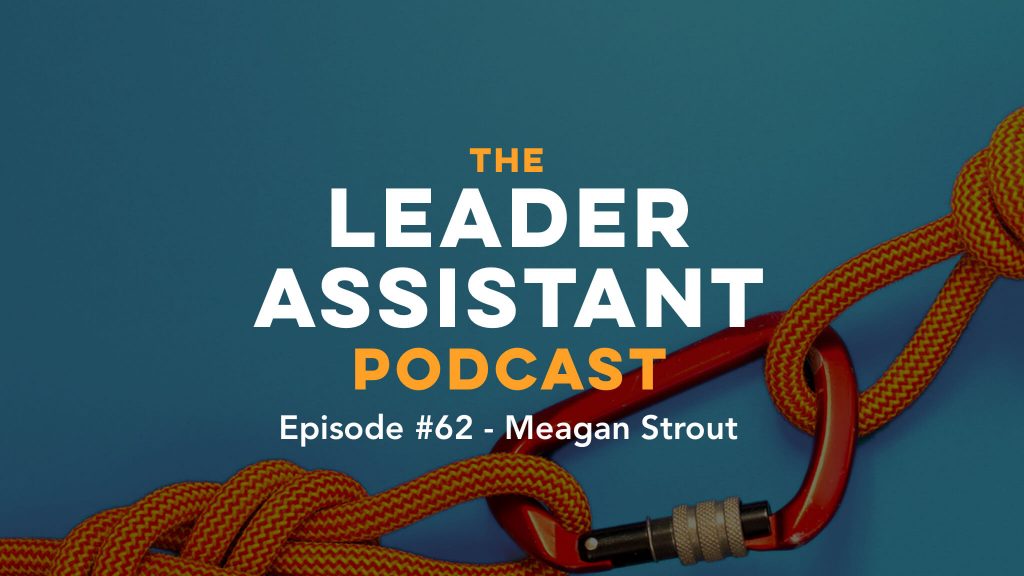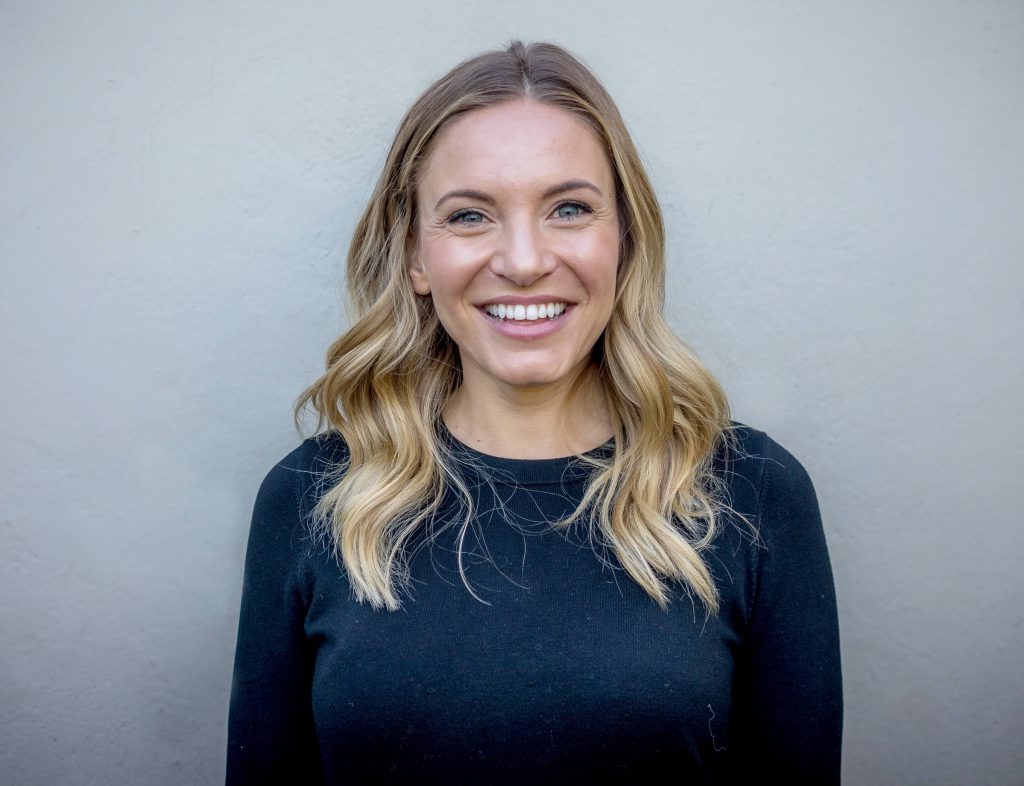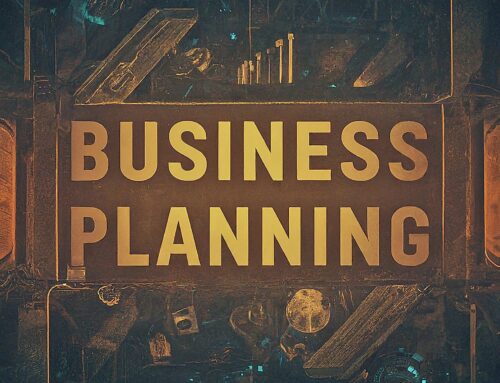Meagan Strout is Founding Partner and CEO of Tack Advisors (Formerly, Elevate Leadership Support Advisors) – the leading provider of recruitment, management consulting, and career development training for administrative professionals, here in the U.S.
Meagan shares a ton of amazing tips on interviewing for a job, crafting a resume, and compensation for assistants. Enjoy our conversation and be sure to check out Tack Advisor’s upcoming webinar schedule here.
Also, be sure to check out Meagan’s game-changing course on preparing for interviews at interview.assistantsguide.com.
LEADERSHIP QUOTE
I believe in people, process and product. But people are the most important thing.
– Marcus Lemonis
CONNECT WITH MEAGAN
ABOUT MEAGAN
Meagan moved to the Bay Area in February of 2016 and began her recruiting career after providing over 10 years of service in luxury hotel management with Four Seasons, The Ritz-Carlton and The Breakers. While working in hospitality, Meagan provided Five Diamond leadership and administrative support to clients and guests around the world. She successfully collaborated with and served CEOs of Fortune 500 companies, politicians, diplomats, royalty, celebrities and athletes. She recruited, on-boarded and trained highly efficient teams and worked hand-in-hand with Executive Assistants and Event Planners across the globe to coordinate and execute multi-million dollar events.
As the Founding Partner and CEO of Tack Advisors (formerly known as Elevate Leadership Support Advisors), Meagan brings the same level of energy and service to her clients, candidates and team. She prides herself on building lasting relationships and providing the knowledge and tools needed to set everyone she works with up for success.
THE LEADER ASSISTANT BOOK
Download the first 3 chapters of The Leader Assistant: Four Pillars of Game-Changing Assistant for FREE here.
SUBSCRIBE
Subscribe to The Leader Assistant Podcast so you don’t miss new episodes!
You can find the show on Apple Podcasts, Spotify, Google Podcasts, Pandora, and Stitcher.
Join my email list here if you want to get an email when a new episode goes live.
JOIN THE COMMUNITY
Join the Leader Assistant Slack Community here, or the Facebook Group here for bonus content and to network with other assistants who are committed to becoming leaders!
LEAVE A REVIEW
If you’re enjoying the podcast, please take 2 minutes to rate and review the show on Apple Podcasts here. Each review helps me stay motivated to keep the show going!
—
EPISODE TRANSCRIPT
Meagan Strout 0:00
I’m Meagan Strout. Today’s leadership quote comes from Marcus Lemonis. I believe in people process and product, but people are the most important thing.
Podcast Intro 0:12
The Leader Assistant Podcast exists to encourage and challenge assistants to become confident game changing leader assistance.
Jeremy Burrows 0:24
Thank you so much for listening all around the world. Hey, everyone, welcome to episode 62. It’s Jeremy Burrows, your host here on The Leader Assistant Podcast. Just wanted to share a little bit about this interview with Meagan Strout. So Meagan is the founding partner of Elevate leadership Support Advisors. They are one of the leading providers for career development, training, management, consulting and recruitment for Administrative Professionals. So this interview was recorded a few months ago at least, and they’ve since rebranded they were formerly known as ELS talent advisors. But they’ve rebranded to elevate leadership support advisors, Meagan and her team are amazing at helping assistants land roles, and I’m really excited for her to share about the interview process, resume creation, and much more. So I’m sure you’ll enjoy the episode. And you can find out more information about them at Elevate ls a.com. That’s elevate ls a.com. Hope you enjoy the interview. Meagan Strout, so good to talk to you. How are you?
Meagan Strout 1:40
I’m doing great. How are you?
Jeremy Burrows 1:43
Doing? Well? What part of the world are you in?
Meagan Strout 1:45
I’m in San Francisco.
Jeremy Burrows 1:47
All right, awesome. What was your first job? And what skills did you learn in your first job that you still use today?
Meagan Strout 1:56
So my first job was when I was 16, I actually got an amazing opportunity to work at a luxury resort in Palm Beach Island, where I’m from, called the breakers. And I started out as a hostess at a seafood restaurant in that hotel, and slowly worked my way into being a server assistant and an expediter. And in that role, I learned about customer service. And that is really been the crux of my career moving forward. I worked full time starting at 16 in that hotel, after school and on weekends, and then ended up going to school for hotel management, and completed my career in Hotel Management after about a decade. And the rest is history.
Jeremy Burrows 2:44
Awesome. I’ve actually been to that hotel. It’s beautiful.
Meagan Strout 2:47
Oh, really? Pretty impressive. When did you go?
Jeremy Burrows 2:50
Oh, man, that was probably, I don’t know, several years ago. 2013 My wife says
Meagan Strout 2:57
that’s for either for business or pleasure.
Jeremy Burrows 3:00
It was both I was we were we were in town for business. But yeah, we got to kind of sneak away and hang out. And it was like at night and we were just walking on the greens and ocean. I mean, it was it’s pretty amazing.
Meagan Strout 3:12
It’s stunning. Yeah, I worked at the seafood bar there. So there you go.
Jeremy Burrows 3:18
Okay, so you were an assistant for a little bit at least Right? Or at least a sales assistant or something. Right?
Meagan Strout 3:24
I was Yeah. So I started out working in food and beverage transition did a front office operations. And then my last job working in hotel management was actually as a sales assistant. And a lot of people thought I was crazy, because I had gotten into being a manager in the front office of a four seasons, but was really passionate and interested in getting into sales. And this opportunity opened up for me to transition into a sales assistant role, which I felt like was an amazing opportunity to learn the industry kind of from the ground up. So that was my last position. And it was an amazing experience.
Jeremy Burrows 4:02
Yeah, like to say that being an assistant for a few years is better than an MBA and a lot cheaper.
Meagan Strout 4:09
Oh, absolutely. 100% agree with you. They’re awesome.
Jeremy Burrows 4:13
So why did you kind of so you’re in sales, what kind of led you into the recruiting world.
Meagan Strout 4:21
So it was completely by chance. I felt like I hit kind of a glass ceiling in my role. There wasn’t a path for development into sales outside of the administrative position that I was in. And as much as I love doing administrative work, I really wanted to get back into a management role. So I started working my network and decided that I couldn’t be in hotels anymore. There wasn’t a path for me and connected with a recruiter in San Francisco. This is one of the cities I was looking at moving to thinking that maybe she would help me get out job as a sales assistant out here, and that way I’d at least get out to the West Coast and, you know, find a position and eventually work my way up. And when I met with her, she actually offered me a job to come work for them. So it totally happened by accident. But it was one of the best opportunities of my life.
Jeremy Burrows 5:20
Awesome. So why do you love being a recruiter?
Meagan Strout 5:24
Well, I love helping people. It’s who I am at my core. I’m an obliger, and an ENFJ. And those personality types love to help others be amazing at what they do. And I also am a hospitality professional at heart and the skills that I learned working in hotel management. You know, high touch customer service, helping people be successful is everything that I do now. And as a recruiter, I just have a lot better work life balance, and it’s a lot more fun.
Jeremy Burrows 5:59
So tell us a little bit about kind of your current gig.
Meagan Strout 6:03
Yeah, so we partner with arguably the world’s most innovative companies, mostly in tech and finance, although we definitely work with amazing retail companies, legal firms, consulting agencies, the sky’s the limit, and where they bring us in. And why we’re really great partners for them is we really act as advocates for their companies, we act as an extension of their talent and human resources teams. Because they sometimes don’t have the bandwidth with their own teams, and don’t have the knowledge and the skills of what an amazing assistant does to be able to attract and recruit that type of talent.
Jeremy Burrows 6:47
So could you share a little bit about how this all came to be?
Meagan Strout 6:51
So our mutual dear friend, Al Hussein, was actually an old candidate of mine. So I connected with him about three and a half years ago, when he was leaving Facebook. And he was referred to me by another EA that I had been working with. And we initially like immediately hit it off. And I never ended up pleasing Him. But we stayed in touch with each other. And he ended up referring other EA friends of his that I did end up placing in roles. And at the time, over the past couple of years, he started working with executive leadership support as a keynote speaker for their forums. And about a year ago, he went to Emily Burley, who you’ve also had on your show, with this idea of you know, hey, the forums are great. You know, we’re having a ton of support, but we’re getting a lot of requests from our clients, asking if they can have us help them find executive assistants, and we’re getting a lot of requests from executive assistants, inquiring how they can find another really great role. So if I can find somebody who is great, who I know that we can trust with the operations to start a recruiting arm of this business, would you be open to starting this new line with me? And Emily and me that it was like, Yes, this is a brilliant idea. I love the idea of branching out and doing more with TLS. And that’s kind of where I came in. And Al Hussein was very kind of sneaky about it. Because Him and I are friends and you know, have gone to dinners and, you know, grab coffees for, you know, ton of times over the years. So he’s just like, hey, let’s catch up. I want to grab a drink with you like, okay, cool. And yeah, I started kind of just picking my brain about how the business was going and then presented this idea to me, and it was just an absolute no brainer. I would never have branched out just to do my own boutique recruiting firm, because there’s a million boutique recruiting firms in the administrative space. But I’ve always had a passion for learning and development. I have a passion, obviously for hospitality and for helping others and so the opportunity to do what I love to do in recruiting but also be an even greater resource for the administrative community was just a dream come true.
Jeremy Burrows 9:16
Awesome. So I’m gonna give you the chance to do your quick elevator pitch. What makes you different in your team different than other talent recruiter firms?
Meagan Strout 9:28
I think there’s a few different things that differentiate us from the rest of the recruiting industry. I think first and foremost, we’re not recruiters. We haven’t been doing this for 20 to 25 years. The kind of old school or antiquated way of doing recruiting is for people to be pounding the phones, you know, getting a job description from a business and then just starting candidate calling candidates that like minimally fit the criteria. It’s very low touch it’s very true. interactional it’s very turn and burn. And that does it work for me and for my team. For us, we really pride ourselves on having a deep understanding of what every single one of our client does. We partner with companies that we’re genuinely excited about. And then we get to know the executives that we are finding EAS for we understand their nuances, we understand their company culture, and then we proactively reach out to our network of executive assistants, and get to know them on a very personal level. And then the matchmaking happens. And quite often in the recruiting world world, all that recruiters are seeing is the the bottom line and the numbers. And they put that above everything else we put the people first.
Jeremy Burrows 10:51
Awesome. So speaking of the people, you’re an EA listening, or if someone’s a office assistant wanting to become an EA, how can one stand out as an EA, what’s something that they can do to kind of set themselves apart during the process of trying to find a job and interviewing and all
Meagan Strout 11:14
that? Yeah. So let’s start kind of first with the the discovery phase, right? If you are either proactively applying for jobs online, or you’d like to be discovered by a recruiter, the first thing you can do is make sure you have really solid social media, LinkedIn should be your best friend. And make sure that on your LinkedIn, you have a really professional photo, that your grammar and what you have listed as your professional skills are appropriate. You know, imagine that this is literally your resume on display to the entire professional world. So if it’s not something that you’d feel comfortable with your grandmother, seeing, make sure that it’s not something that you would want a potential executive or investor to see. The The second thing is, in the actual interview process, make sure you’re asking thoughtful questions, during the interview to show that you are genuinely interested in the company and that you’ve done your research on the firm. And so the most common question people get asked is, you know, why are you interested in joining ELS talent advisors? You should be able to answer that and are really direct and concise way, not just oh, well, you know, I saw you had an open position. So I applied for it on LinkedIn, and said, you want to say, you know, I am super jazzed about what ELS talent advisors is doing. I love that you’re a people first company, I love that you really take the time to understand your executive assistant and your clients and that being a matchmaker is, first and foremost are your number one goal. And I want to be part of that type of mission. And then finally, the last part is once post interview, make sure you send a thank you note. They’re so underrated and I can’t tell you how many times I’ve had a client pass on a candidate because they didn’t get a thank you email after the the interview. So remember that a thank you note is your last impression and should really be viewed as an extension of the interview process. And it’s also an opportunity for you to present your written communication skills, and it shows your ability to follow up in a timely manner.
Jeremy Burrows 13:38
Great tip. So what about resumes Is there a couple of do’s and don’ts you can share?
Meagan Strout 13:44
Absolutely. So things you should do. Use bullets and not paragraphs. As much as I love seeing a well composed paragraph about experience and executive and an Android recruiter is only going to take about seven seconds to scan your resume before deciding whether they want to meet with you. So you need to make your resume scan proof with exciting action verbs using statistics using industry, industry specific words that’ll grab their attention. Another thing you can do is keep your resume to two pages Max and limit your experience. So the last 10 years, anything more than 10 years and two pages is too much and no one’s going to look at it. And if you worked for an absolutely stellar leader maybe 12 or 13 years ago, then it’s appropriate if you want to do a quick line about like the company name, the title and the dates, but you don’t necessarily need to elaborate with additional bullet points afterwards. And then things that I wouldn’t do on your resume. Don’t include a relevant work experience. So for example, I mentioned before I worked in Hotel Management starting at 16. And at I now work as a recruiter. And my hotel experience to me translates a lot into what I do. But what you don’t know about me is I also worked part time at Abercrombie and Fitch in high school and two years during college, I worked as a full time nanny, those experiences aren’t quite so relevant. And quite often people have, you know, two or three jobs at a time. Unless the role is administrative in nature, it probably doesn’t need to be on your resume. And then I think the last thing that’s pretty obvious, but I will say it again anyway, is don’t have typos on your resume. Please Proofread your resume. Have your mom Proofread your resume your wife, your nine year old daughter, your cousin, your neighbor, your dog, whatever you get the picture, just don’t have typos on your resume.
Jeremy Burrows 15:47
Nice, nice. So let’s dive into the interview process. You know, interviews can be pretty intimidating. You’re you know, you’re excited that Oh, I got an interview. And then you’re like, Oh, crud, I got an interview. So, yeah, share some tips that you’ve walked your candidates through over the years that have really helped them nail the interviews?
Meagan Strout 16:12
Yeah. Well, I think first and foremost, having a really solid understanding of a company will put you at ease. There are so many great tools out there, you can go on CrunchBase, you can do a quick and easy Google search. You can go on LinkedIn. So Hunter standing the company, knowing basic stats, like when they started, what they do, who works there, how many employees how many offices, that’s all really great information to walk in feeling competent into the interview, ask a lot of questions. I think people get intimidated to ask questions in an interview, but that makes the conversation more organic. And it shows you’re interested in what they’re saying to you. Make sure
Jeremy Burrows 17:02
you would be okay. Oh, sorry, what would be a good question to ask? Just off the top of your head.
Meagan Strout 17:07
Yeah. So they say you’re McGahn interviewing for an executive assistant position. And you did your research in advance and saw that there are five other EAS in the company, and all of them had an average tenure of three to five years of experience with the firm that’s really telling right now, especially because most people are only staying with companies for an average of 18 to 24 months. So you can easily say, I noticed that your admin team has been with you for at least three to five years, what is your secret sauce, what makes people want to stay, and then that’s gonna get them super excited, like, wow, they did their homework, they can tell that we have a good culture, I’m super excited to tell you about this. Awesome. Awesome. And some other things that you can do. I mean, know how to sell yourself. And this is probably a conversation, an entirely separate podcast we could have about knowing your strengths and accomplishments and knowing how to make kind of unarguable or objective statements about yourself. But it’s so important to be able to articulate what you bring to the table. Because that’s what’s really going to make or break you in making the interview worthwhile. Um, and then as far as some other things that you can do, just to make yourself comfortable and put yourself at ease is, you know, day of the interview, make sure you’re wearing clothes that you’re comfortable in, but that are also professional, you know, make sure that your outfit fits correctly, so you’re not tugging on it. Make sure that you’re not wearing any jewelry, or you know, maybe a tie that you’re going to be you know, fiddling with during the interview. Make sure that you give yourself plenty of time to arrive early. you factor in an extra 30 minutes and go to a coffee shop next door. The worst thing you could do is end up getting stuck in traffic and then be late and show up frazzled to the interview. Of course, bring a copy of your resume. Take notes during the interview. This is one I absolutely love. Bring a padfolio with you. And while they’re talking take notes because all you’re doing is reinforcing your administrative prowess and what good EA doesn’t go to a meeting and take notes. do eat some food before I just heard that Bananas are a really good thing to eat before an interview because it helps kind of level out any anxiety that you have. And then you can also mirror body language and communication style during an interview. That’ll put you at ease and it also puts your interviewer at ease.
Jeremy Burrows 19:46
Awesome. Wow, I’m ready to go do an interview. Yeah,
Meagan Strout 19:51
that’s the fight.
Jeremy Burrows 19:54
Don’t tell my boss that.
Meagan Strout 19:56
Keep that confidential.
Jeremy Burrows 19:59
All right. So Well, what are some questions that your clients and the companies you work with? ask you about? assistance?
Meagan Strout 20:09
Yeah, absolutely. I’m actually really excited that you asked this question because it gives the people listening to this a little bit more context about why your recruiter is being so nosy and asking you a million questions when they meet you. We want to really know you. But we also want to make sure that we can articulate your experience because we’re gonna get grilled by these clients when we meet with them. So the most common questions that clients ask us are, you know, why is this candidate looking? What are their reasons for leaving their current company? Why do you think they would be a great fit for us? What’s their personality? Like? What are they looking for? Why are they interested in us? Why would they want to go from a big company like Cisco to a small company like, you know, ABC repairs? Or vice versa? Why do they want to switch industries? And what are you seeing in the market for compensation?
Jeremy Burrows 21:14
Let’s talk about compensation for a minute. Yeah, fun topic. Any, I think the hardest thing for compensation? Well, the two hardest things, I think, that I’ve seen is, is talk to assistants. Yeah, out in the world, in different cities and different companies is the two things are one. They it’s kind of still taboo to talk about it. Or it’s, you know, it’s still not really welcomed in a lot of circles as far as like talking to your co workers about how much they make. And, you know, really, so you don’t really have a lot of, or I’ve found that it’s hard for assistants to know what people are making. But then on the other side, the second thing would be, it’s hard to get kind of objective data, external data as well. So what are your tips on if you’re in the job market, looking for an EA role? Maybe even no matter what city you’re in, what are your tips on just kind of researching and figuring out where your compensation levels should be?
Meagan Strout 22:29
So you bring up a good point, that compensation is not objective, it’s very subjective. I tell this to a lot of EAs who work with me on a regular basis, I can’t tell somebody just from looking at their resume or having a 15 minute conversation with them, what they should be making in their marketplace. Because there’s so much more that goes into what you make, it no longer has to do with how many years of experience you have, or, or even what industry you work in, it has a lot more to do with the pace and the volume of the work that you’re doing, and the level of executive you’re supporting. So, for example, I’ve worked with executive assistants who have had 10 years of experience, but have been in an industry that moved at a much slower pace, maybe they were only scheduling two or three meetings a day for an executive and their executive only traveled one time per quarter that they have 10 years of experience. And in San Francisco, they’re making $80,000. Whereas I have somebody with two years of experience in San Francisco, who has been at a startup and their executive is back to back seven meetings, eight meetings a day and travels on a weekly basis. They’re booking like eight to 10 trips a month to you know, all over the world. And they’re making $110,000. So, to be honest, that pace and volume does equate to $110,000 in the Bay Area. Is that fair? You know, that’s another discussion, but it no longer has to do with how long you’ve been in the industry, it really has to do with the amount of value in regards to like level of support that you’re doing for your executives.
Jeremy Burrows 24:29
Yeah, so how can assistants quantify the value or even communicate their value when they’re going through this process?
Meagan Strout 24:43
Yeah. Well, the easiest way is to partner with a recruiter. Have them go through your experience with you. So every single executive assistant I work with, goes through a one hour technical screen, I call it a technical screen, but it’s really just to deep dive into their experience, and that’s when we talk about those, that pace and volume that I just mentioned. And from there, I’m able to compare your experience apples to apples to other people in the industry. Because I’ve been doing this, I’ve spoken to 1000s of executive assistants and, you know, across a bunch of different industries, and then I can really objectively say, okay, because you’re doing this much countering this much travel, you’ve, you’re working on these type of projects, this puts you in a very similar kind of bracket with other EAS making this much money. So really, this is what you should be targeting for your next goal. And so that’s really the easiest way to do it. I’m partnering with a recruiter who, who knows that information. You know, I think other things you can do, and I’m sure you have quite a bit of this on your Slack channel is to network with other EAS and understand what people are making and what compensation looks like across different industries, because it looks different in every type of company. You know, you get venture capital firms that are typically offering the salaries that have, you know, a pretty standard base, and then like a 10 to 20% Bonus, versus hedge funds that offer, you know, much lower bases, but then they offer like a 50 to 80% bonus. And then you have tech firms that don’t do bonuses at all, but they offer higher base and then equity. So there is no one size fits all. And you have to kind of understand the whole picture and what that whole package looks like.
Jeremy Burrows 26:39
Yeah, it’s definitely tricky to navigate. And I think that’s why it’s important to be in community with other EAS. So you can kind of make yourself aware of what’s going on out in the industry. And then like you’ve mentioned, partnering with, with people like ELS talent advisors, and others just to really go to bat for you
Meagan Strout 27:03
exactly. And then that’s the other thing too. And I tell a lot of executive assistants and in clients as well as it’s in our interest, our best interest to get you what is fair and equitable for you in this marketplace. Because if you don’t get a good offer, when you’re making a move, you’re easily going to get scooped up by another company and one to two years that’s going to offer you what you really should be making in this marketplace. Right. So we act as advisors, not only for the candidates to say, hey, you know, based on your experience, this is what you should be making. But when we go and we take a search with a client, quite often when they ask that, what are you seeing in the market for compensation question, after we’ve taken a full search and really understand their wants and needs, we can say hey, I know you said you want to pay 90,000. But what you really want and what you’re targeting is an executive assistant in the like 120 to 140 K range. And you can certainly look at people at 90, but that’s probably not going to give you what you really want.
Jeremy Burrows 28:06
Awesome. So speaking of what they want, what are your clients looking for in their hires?
Meagan Strout 28:14
Yeah, absolutely. Experience, right. And again, that experience can vary depending on their very unique needs. But they want minimally, someone who can do the calendar, the travel and expenses that Holy Trinity flawlessly. But they also love seeing diversity in the role. So experience planning events, and that can be internal events, like company happy hours and celebrations to external events like investor meetings, recruiting events, anything like that projects, certain project management, maybe bringing on a new system to the company, I regularly talk to executive assistants who implement a new Travel and Expense program with their company, or bring on a new type of communication software. So that’s really great experience to get other operational experience like doing space planning for your company as they continue to grow. or implementing or managing facilities for the firm is another great experience to get. And then of course admin management. And you don’t even have to be a formal admin manager. But being a mentor and implementing some type of admin, you know, monthly meetings to talk about best practices is another great way to kind of up level yourself. They also love to see promotions from within. And again, going back to the fact that most individuals stay with a company for just 18 to 24 months. Somebody who stayed with the company longer than that and has had growth within that firm. or maybe starting out as a receptionist and moving into a junior admin and then growing into an EA or supporting a VP as an executive assistant and moving into supporting the C level that’s very attractive to our clients. Education. And this isn’t consistent across the board, but my top clients love to see a four year degree and from a reputable school a top 75 schools ideal. How do I feel about that? I went to community college first and then I finished at a you know, top 75 school but and I know a lot of stellar EAS who don’t have a degree. But it I have seen in the marketplace EAS that have a four year degree, consistently making more money and getting more promotions. So it’s something to think about. As far as professionalism goes, your the way you present yourself, not only in your appearance, but the way that you communicate is super important. executives want you to be the face of them, they want to know that when an investor is coming in the door, or a CEO is coming in the door, that they can trust you to greet them to be warm to set them up in a room and make sure they’re successful. And that, you know, if you’re in their inbox, and you’re responding to emails on their behalf, they don’t have to worry about you using incorrect grammar. And so all of these things are super important and stuff that they’re paying attention to, which is why I continue to harp on having great social media and having a crisp and clean LinkedIn because it really does matter.
Jeremy Burrows 31:49
It’s awesome. So when you talk about education, I get a lot of assistants reaching out saying, you know, should I be certified? Should I get a, you know, admin certification? Have you seen you mentioned the four year degree being fairly common? Different level of, you know, promotions, and, you know, pay and all that. Have you seen like any of the certifications do that as well? Or is that also dependent upon kind of the company?
Meagan Strout 32:22
I’d say it’s more dependent on the company. And I would say that the certifications are I would say it would be a better investment of your money to in get yourself involved in a type of forum or conference. But I think the the greater value in certifications or events is the opportunity to network with other executive assistant is to learn from industry professionals, people who are speaking coaches, people who are masters in certain types of technology, and then to learn best practices from each other. Because what I’ve found, and what I’ve heard from a lot of executive assistants is they, they are somewhat siloed, either within their own company or even within their own office, and don’t necessarily have the exposure to learn and hear about experiences from other EAS. And so the opportunity to be in a more collaborative environment, and hear about what other people at your competitors are doing is probably more valuable, and a better spend on your money than paying for some really expensive certification.
Jeremy Burrows 33:44
Cool, thanks for sharing your experience on that. Okay, so what makes an assistant, a leader?
Meagan Strout 33:55
Oh, there’s a lot that that makes an assistant leader. I mean, ultimately, going back to what I said before, you’re the face of your executive. And quite often, especially when you get to supporting SVPs, you know, executive C level executives, you’re the one that’s the liaison between your executive and the rest of the firm. And so your ability to manage up to your executive and manage down to their direct reports in a way that is graceful in a way that is understanding that really helps set priorities and, you know, be somebody who can be a gateway instead of a gatekeeper, I think makes you a really great leader. And I know from working with a lot of great executive assistants, they are looked at, by their executives direct reports and by their executives as well as those sounding boards and The people that they can go to to trust and share any concerns that they have and know that whatever they are told is going to be filtered in the best way possible to get things done.
Jeremy Burrows 35:16
Love it great tips. Megan, I really appreciate you sharing your story and your experience with my listeners, lots to think about lots to really research and really help us all be better assistants, and then be better prepared for job change. So thank you so much.
Meagan Strout 35:36
Oh, it’s my pleasure. I really appreciate you having me.
Jeremy Burrows 35:39
Awesome. Well, people can check out elevate ls a.com, to look up your team and find out what you’re doing. Where else can they find you.
Meagan Strout 35:51
Of course, me and my team are all on LinkedIn. So you can find us there. And then as far as what we’re looking for, and how we can support you, if you are an executive assistant listening, and you have any questions about what you can do to make yourself a more desirable candidate. I’m happy to speak with you about that offline, feel free to send me an email directly. You can also directly apply to any of the jobs that we have on our website. We keep them alive and updated on a daily basis. And if you’re a client or somebody who’s looking to hire somebody, you can reach out to us. We’d be happy to set up a phone call with you and hear more about your needs.
Jeremy Burrows 36:38
Perfect. We’ll all share all that information in the show notes so people can get a hold of you. And yeah, thanks again. Meagan.
Meagan Strout 36:46
Absolutely. Thank you. All right.
Jeremy Burrows 36:49
Thanks again, Meagan. For a great episode, check out the show notes at leaderassistant.com/62 to find information on elevate leadership support advisors also reminder that my book comes out in just a few weeks on June 23. So you can download the first few chapters free at leaderassistantbook.com. Or there’s another few days left to preorder the hardcover bundle at leaderassistantbook.com/launch Have a good one and we’ll talk to you next time.
Unknown Speaker 37:36
You on Apple podcast goburrows.com







